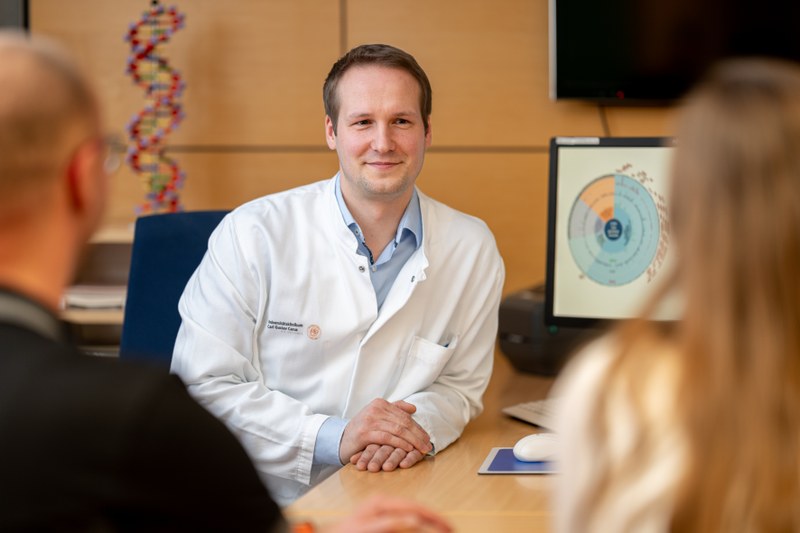
Genome sequencing for rare diseases and cancer
The University Hospital Carl Gustav Carus Dresden has been awarded the contract to participate in the model project Genome Sequencing for Tumor Patients and Patients with Rare Diseases.
The University Hospital Carl Gustav Carus Dresden has been awarded the contract to participate in the model project Genome Sequencing for Tumor Patients and Patients with Rare Diseases. The model project is a project for comprehensive diagnostics and therapy development. Hospitals from all over Germany were able to apply to participate until 2023 - Dresden University Hospital, along with 27 others across Germany, was awarded the contract in both areas.
This means that, for the first time, a genome-wide analysis of the entire genome will be possible as part of knowledge-generating care financed by the health insurance funds. This offers new opportunities for diagnosis and treatment, particularly for patients with rare or oncological diseases that are based on changes in the genetic material of body or tumor cells. "We are very pleased about this award. The approval and thus the fulfillment of all requirements underline the outstanding quality of our work at Dresden University Hospital. Genome sequencing is already established and tried and tested here. We work together on a multidisciplinary and cross-structural basis in order to make precise diagnoses for patients with oncological and rare diseases and to be able to apply individual therapy approaches," says Prof. Uwe Platzbecker, Medical Director at Dresden University Hospital.
For many people with a rare disease, the path to diagnosis is still often difficult and lengthy and requires a great deal of strength from the patients and their families. However, the diagnosis is crucial for the further care and support of the person with the disease and their relatives, for example for the adaptation of therapy, the implementation of further diagnostics, the organization of their personal life and further family planning. Genome analysis in patients with rare diseases makes it possible to uncover previously undetectable genetic changes that have probably contributed to the onset of the disease.
The same potential also applies to the individual analysis of cancer. This is because active substances are increasingly available for the treatment of tumor patients that target specific altered molecules in malignant cells. At the same time, changes in the genetic material of tumor cells can mean that they do not respond well or at all to certain treatments. The aim of personalized oncology is therefore to adapt the patient's treatment to the individual profile of the changes in the tumour cells. A comprehensive overview of the changes in the tumor genome enables optimal treatment planning.
For both patient groups, the genome sequencing model project aims to expand the possibilities of medicine and give hope to patients suffering from the disease. "This gives us the opportunity to offer patients a broad range of state-of-the-art molecular diagnostics. The now possible use of genome-wide high-throughput sequencing as part of the genome sequencing model project currently represents the best possible diagnostics for patients with a genetic rare disease," says Professor Evelin Schröck, Director of the Institute of Clinical Genetics and Head of the Center for Clinical Genomic Medicine at Dresden University Medicine. "The model project will sustainably improve the highly specialized interdisciplinary care of patients with rare diseases," says Professor Reinhard Berner, spokesperson for the University Center for Rare Diseases (USE).
Professor Hanno Glimm, Member of the Executive Board of Directors of the National Center for Tumor Diseases (NCT/UCC) Dresden and Spokesperson of the Center for Personalized Medicine in Oncology (ZPMO) adds: "Building on more than ten years of expertise in the clinical interpretation of whole genome sequencing, the model project gives us the opportunity to tailor therapy to the individual molecular tumor profile of even more patients in the best possible way."
The structures at Dresden University Hospital provide a quality-assured workflow for the molecular analysis and clinical evaluation of rare and oncological diseases. Patients benefit from the many years of experience in the clinical evaluation of whole genome sequencing data. More than 450 patients per year can also benefit from a procedure tailored to the molecular changes. These examinations, which can initially be carried out over a period of five years, form the basis for the decision as to whether genome sequencing will become part of standard care in a few years' time.
As of now, patients with previously unsolved rare diseases can contact the Genetic Outpatient Clinic of the Institute of Clinical Genetics and the University Center for Rare Diseases.
Patients with advanced tumour diseases can contact the Centre for Personalized Medicine in Oncology (ZPMO) Dresden directly or via their treating physicians.
Information on participation in the pilot project at Dresden University Hospital:
https:// www.uniklinikum-dresden.de/de/einweiser-und-arzte/modellvorhaben-genomsequenzierung
Contact:
University Hospital Carl Gustav Carus Dresden
Prof. Dr. med. Evelin Schröck
Director of the Institute of Clinical Genetics and Head of the Center for Clinical Genomedicine at the USE
Phone: +49 351 / 458 15136
evelin.schroeck@uniklinikum-dresden.de
Prof. Dr. med. Hanno Glimm
Head of the Department of Translational Medical Oncology at the NCT/UCC Dresden and Head of the Center for Personalized Medicine in Oncology (ZPMO) Dresden
Phone: +49 351 458-5540
hanno.glimm@uniklinikum-dresden.de
Prof. Dr. med. Gustavo Baretton
Director of the Institute of Pathology
Phone: +49 351 458-3000
gustavo.baretton@uniklinikum-dresden.de
Prof. Dr. med. Reinhard Berner
Clinic Director Clinic and Polyclinic for Pediatric and Adolescent Medicine and Spokesperson
University Center for Rare Diseases (USE)
Phone: +49 351 458-2440
reinhard.berner@uniklinikum-dresden.de


